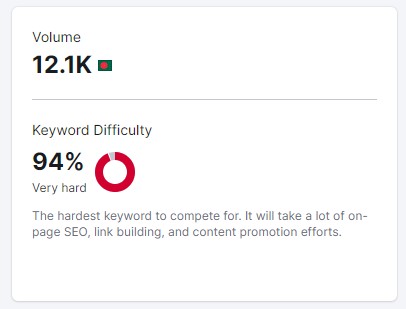Contact Info:
+88 01601135050
[email protected]

Feeling like you’re shouting into the void of the internet? Ever wonder why your amazing content isn’t getting the attention it deserves? The culprit might be a lack of understanding of how people search online. Here’s where keyword research comes in as your trusty guide.
This isn’t about stuffing your content with random words – it’s about unlocking the secrets of what your target audience is actually typing into search engines. Imagine crafting content that perfectly answers their questions and positions you as an expert. That’s the power of keyword research!
In this post, we’ll delve into the world of keywords, showing you how to find the right ones and use them to take your content from hidden gem to search engine superstar. Get ready to boost your website traffic, attract new leads, and finally get your voice heard!
Keyword research is the foundation of understanding how people search the web. It’s the process of discovering the words and phrases that your target audience uses to find information online.
This valuable information helps you optimize your content, website, or marketing campaigns to appear higher in search engine results pages (SERPs) for those specific terms.
Think of keywords like signposts on a highway. By understanding which keywords people use, you can strategically place your content along the way, making it more likely that searchers will find you.
Before you can create content that resonates with your audience and ranks high in search results, you need to understand what they’re searching for. This is where keyword research comes in – the strategic process of uncovering the words and phrases your target audience uses online.
Here’s a breakdown of the key steps involved:
It all starts with understanding who you’re trying to reach. Consider demographics like age, location, and interests. What are their goals and challenges? What kind of language do they use? By creating a clear picture of your ideal customer, you can identify keywords that are relevant and impactful for them.
Think of seed keywords as the starting point for your research. These are broad topics that encompass your niche. For example, if you’re a bakery, your seed keywords might be “cakes,” “pastries,” or “bread.” Jot down a list of relevant terms that come to mind.
Once you have your seed keywords, it’s time to delve deeper. Here are some powerful tools and techniques to help you expand your keyword list:
Start typing your seed keyword into a search engine and see what suggestions pop up. These are real search queries people are using, giving you valuable insights into user intent.
See what keywords your competitors are ranking for. Tools like Semrush and Ahrefs can help you uncover their top keywords, giving you a strategic edge.

Keyword research isn’t just about finding relevant terms – it’s about choosing the ones with the most potential to achieve your goals. This is where keyword metrics come in. These metrics provide valuable insights into the characteristics of each keyword, helping you make informed decisions.
Let’s explore the key metrics you need to understand:
Search volume refers to the average number of times a particular keyword is searched for in a given period, typically a month. This metric tells you how popular a keyword is, giving you a sense of the potential traffic it can drive.
Generally, keywords with higher search volume have the potential to attract more visitors.
Keyword difficulty indicates how challenging it is to rank your website on the first page of search results for a specific keyword. This metric considers factors like competition from other websites and the overall authority of your domain.
High search volume keywords often come with high difficulty, meaning you might need a robust SEO strategy to compete.
Understanding search intent is crucial for crafting content that resonates with your audience. Search intent refers to the user’s purpose behind a search query.
There are three main categories:
By aligning your content with the user’s search intent, you increase the chances of them finding your content valuable and engaging.
In the next section, we’ll discuss how to weigh these metrics and choose the right keywords for your content strategy.
Now that you’ve uncovered a treasure trove of keywords and understand the data behind them, it’s time to make strategic choices.
Here’s how to select the keywords that will bring the most value to your content strategy:
The ideal keyword would have high search volume (lots of people searching) and low difficulty (easy to rank for). Unfortunately, such unicorns are rare. The key is to find a balance. Here are some things to consider:
Target a combination of high-volume, medium-difficulty keywords and lower-volume, low-difficulty keywords. The high-volume keywords will drive significant traffic in the long run, while the low-volume ones can provide quicker wins and help you establish authority in your niche.
If you’re a new website, competing for highly competitive keywords might be tough. Focus on lower-difficulty keywords and gradually build your SEO strength.
Long-tail keywords are longer, more specific phrases that users might search for when they’re closer to making a decision. For example, instead of targeting the broad keyword “running shoes,” you could target “best running shoes for flat feet.” While the overall search volume might be lower, long-tail keywords offer several advantages:
LSI keywords are semantically related terms that help search engines understand the broader context of your content. While not directly targeted, including LSI keywords throughout your content demonstrates topical depth and relevance.
For example, when targeting the keyword “running shoes,” some relevant LSI keywords might be “running form,” “marathon training,” or “different types of running shoes.”
Now that you’ve identified your golden keyword targets, it’s time to leverage them to create impactful content and improve your website’s visibility.
Here’s how to implement your keyword research effectively:
Your keyword research should be the driving force behind your content creation. Here’s how to integrate it seamlessly:
Use your target keywords to brainstorm content ideas that address specific user needs and search queries.
Group related keywords around a central theme. This allows you to create in-depth content that covers various aspects of a topic, improving your topical authority and user experience. (We’ll delve deeper into content clusters in the next section.)
Schedule the creation and publication of your content based on your keyword strategy. This ensures you’re consistently targeting relevant keywords and keeping your audience engaged.
Once you’ve planned your content, optimize it for search engines using your target keywords. This includes:
Incorporate your target keywords naturally into your titles, H1 tags, and subheadings. This helps search engines understand the content’s focus and users quickly grasp the main points.
Craft compelling meta descriptions that include your target keyword and entice users to click on your search result snippet.
While keyword stuffing is a bad practice, weave your target keywords naturally throughout your content. Focus on creating valuable, informative content that resonates with your audience.
Content clustering is an advanced SEO strategy that involves grouping content around a central theme or topic. Each cluster should contain a pillar page that provides a comprehensive overview of the topic, surrounded by supporting content targeting related long-tail keywords.
This structure offers several benefits:
By creating in-depth content on a specific theme, you signal to search engines that you’re an authority in that niche.
Users can easily navigate between related content within a cluster, finding all the information they need in one place.
The interlinking between content within a cluster strengthens the overall SEO power of each page, potentially increasing your ranking for all the targeted keywords.
Keyword research helps you create content that directly addresses your audience’s needs and search queries, leading to higher engagement and conversions.
By strategically integrating keywords throughout your website, you signal to search engines the relevance of your content to specific search terms, potentially boosting your ranking in search results.
Keyword research provides valuable insights into user behavior and search trends, allowing you to make data-driven decisions about your content creation.
| Tools Name | Price (starting monthly cost) |
|---|---|
| Semrush | $139.95/mo |
| Ahrefs | $129/mo |
| Google Keyword Planner | Free |
| AlsoAsked | $12/mo |
While many advanced tools require subscriptions, several free options can get you started. Here are a few: Semrush, Ahrefs, and Google Keyword Planner.
Keyword research is an ongoing process. Identify new trends and emerging keywords in your niche.
While high-volume keywords offer the potential for significant traffic, they’re often highly competitive. Consider a mix of medium-difficulty keywords, low-difficulty keywords, and long-tail keywords.
Keyword research isn’t about finding the golden key – it’s about deciphering the map your audience is already using to navigate the web.
Shahin Alam, an SEO expert in Bangladesh
Keyword research is the cornerstone of any successful SEO and content marketing strategy. By understanding the words and phrases your target audience uses to search online, you can create content that resonates with them, attracts qualified traffic, and positions you as an authority in your niche.
Remember, keyword research is an ongoing journey, but the rewards of attracting targeted traffic and achieving your marketing goals are well worth the effort.